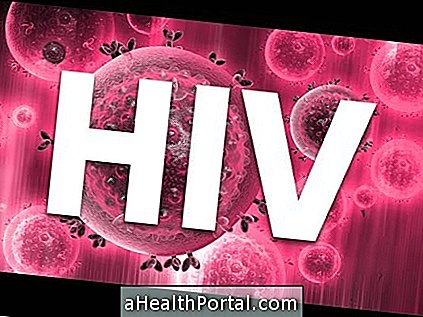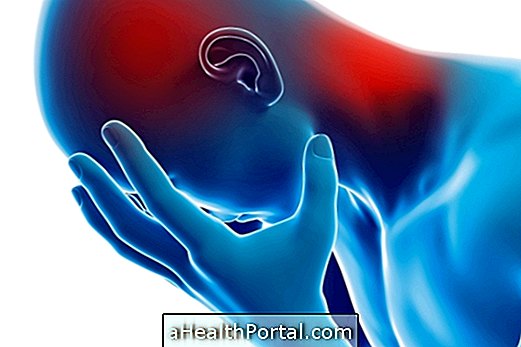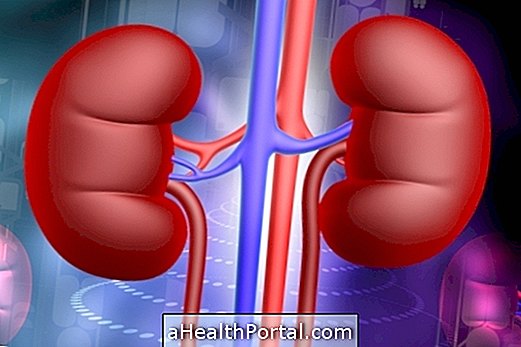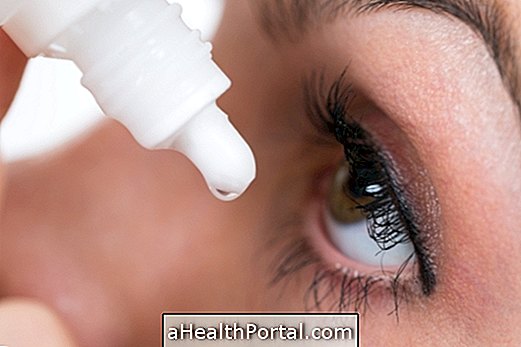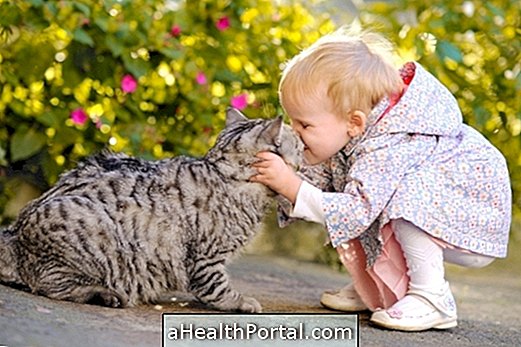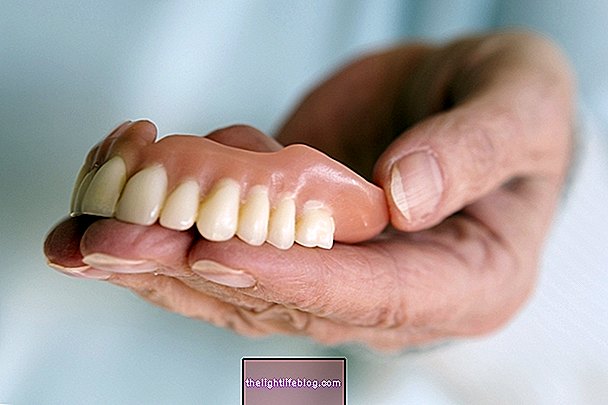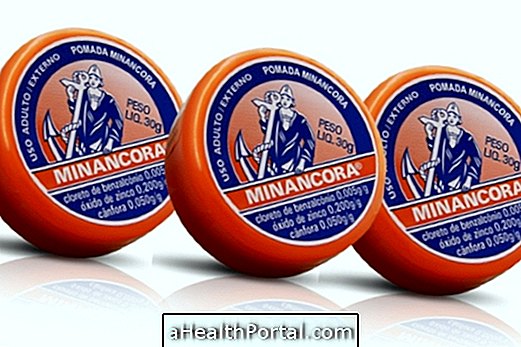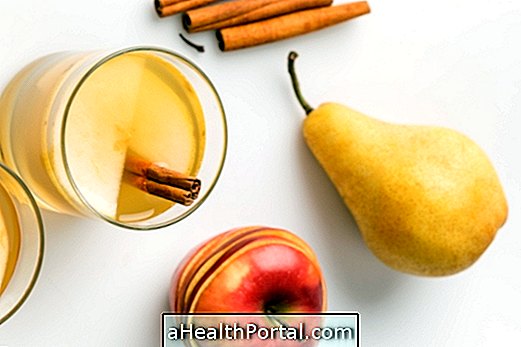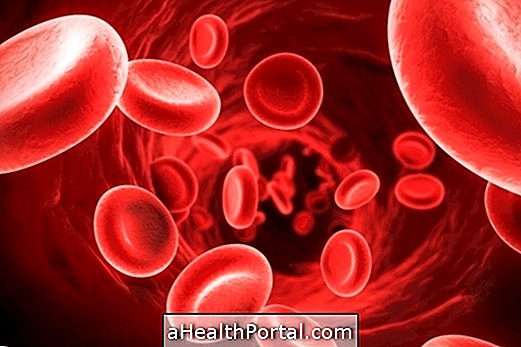Throat itching can arise in a number of situations such as allergies, exposure to irritants, infections or other conditions that are usually easy to treat.
In addition to the scratching throat, it is also very frequent the appearance of cough, which in most cases is a defense of the body to this irritating stimulus, but other symptoms such as swelling in the throat or coryza, for example.
The most common causes usually include:
1. Dehydration

Dehydration is an insufficient amount of water in the body due to factors such as insufficient fluid intake, diarrhea, vomiting, sunstroke or excessive sweating. Dehydration can be accompanied by symptoms such as throat itching, thirst, mouth, dry skin and eyes, decreased urine and blood pressure, and in more severe cases, increased heart rate and dizziness.
How to treat
Treatment consists of ingestion of isotonic beverages and solutions with salts for oral rehydration found in pharmacies, or make a homemade serum at home by mixing 1 tablespoon of sugar and 1 teaspoon of salt in a liter of water and after cool, go drinking throughout the day. In addition, water-rich foods such as watermelon, orange or pineapple may also be ingested. See other foods rich in water.
2. Allergic rhinitis

Allergic rhinitis is an inflammation of the mucosa of the nose caused by an allergic reaction, leading to the onset of symptoms such as sneezing, runny nose, dry cough and itchy nose and throat. This disease usually occurs after contact with allergic substances such as dust, animal hair, pollen or some plants, and is therefore more frequent during the spring or autumn.
How to treat
Allergic rhinitis can not be cured, but it can be treated with antihistaminic drugs such as loratadine, cetirizine or desloratadine for example, and contact with allergy substances should be avoided as much as possible. Learn more about treatment.
3. Food allergy

Food allergy is an exaggerated inflammatory reaction to a specific substance in the food and may manifest in different regions of the body such as the skin, eyes, nose, or throat. In addition, swelling in various regions of the body may also occur, reaching the mouth and tongue and causing severe respiratory distress.
Drug allergy is very similar to food allergy, however it is easier to identify the allergen, since the allergic reaction is given shortly after taking the specific medication.
How to treat
Treatment consists of the administration of antihistamines such as loratadine or cetirizine, or corticosteroids such as deflazacorte or prednisolone, but in case of severe reaction, it may not be sufficient and therefore one should go immediately because the allergy can to an anaphylactic shock. Know what to do during an anaphylactic shock.
It is also very important to do a food allergy test in order to avoid the foods that are the source of the problem.
4. Exposure to irritants

Exposure to irritants such as tobacco smoke or car exhaust fumes, cleaning products and other toxic or irritating substances can irritate the throat and may also cause itching and coughing on the spot.
How to treat
Avoiding exposure to substances that cause itching of the throat is the most effective measure. However, if this is not possible, it is possible to use calming tablets that have honey, lemon or ginger in their composition, or gargle with solutions based on water and salt.
5. Tonsillitis or flu

Some respiratory infections such as tonsillitis, pharyngitis, or flu may make the throat itchy before it progresses to more severe symptoms such as pain or inflammation on the spot. Symptoms may also include coryza, cough, fever, itching in the ear, shivering and discomfort.
How to treat
Treatment depends on the type of infection, and usually for tonsillitis or bacterial pharyngitis the doctor may prescribe antibiotics such as amoxicillin, erythromycin or penicillin, and analgesics and anti-inflammatories to relieve pain and inflammation such as paracetamol and ibuprofen. If it is a flu or a viral pharyngitis, the treatment consists of treating the symptoms as inflammation, pain and fever, with analgesic, anti-inflammatory and antipyretic medicines like acetaminophen, ibuprofen, aspirin or novalgina.
In addition, medicines for dry coughs such as Atossion or Doprepisin, or for coughs with phlegm such as Bisolvon or Mucosolvan, and antihistamines may be needed to alleviate allergic symptoms, such as desloratadine or cetirizine.
Gastroesophageal reflux

Gastroesophageal reflux consists of the return of the contents of the stomach to the esophagus towards the mouth, causing pain, unpleasant taste and in some cases itching in the throat due to irritation caused by the acidic contents of the stomach. This happens when the muscle that should stop stomach acid from coming out of the inside does not function properly.
How to treat
The treatment for reflux consists of taking antacids that neutralize the acidity of the stomach, preventing burning in the esophagus, such as Pepsamar or Omeprazole and prokinetics such as domperidone, which accelerate gastric emptying, thereby decreasing the time that food remains in the stomach .
7. Side effects of medications

Some medicines can cause itching in the throat as a side effect, not to be confused with an allergic reaction, which is very common in people taking ACEIs, for example, medicines used to lower blood pressure.
How to treat
Usually this side effect will diminish over time, however, if it persists and causes a lot of discomfort, it may be necessary to replace the medication. Also, taking a spoonful of honey, gargling with salt and water solutions, or drinking tea with ginger and lemon may help relieve itching in the throat.

